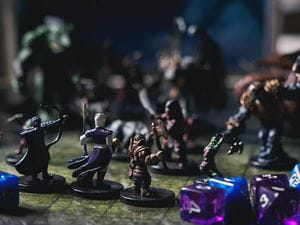
In my four years of teaching theology at Wheaton College, one of my most memorable meetings was with a student wanting to know how best to defend Dungeons & Dragons to skeptical relatives.
Students ask me all kinds of things during my office-hours appointments, but this was a first. I was aware of D&D’s role in the satanic panic of the 1980s, but I assumed most suspicion toward the game had disappeared now that cooler heads and more informed minds had prevailed.
Unfortunately, I was wrong.
Dungeons & Dragons is the oldest commercially available fantasy role-playing game. Now in its fifth edition, D&D has been around since 1974 when Gary Gygax and Dave Arneson published their first set of rules.
Though it’s been played for almost half a century, we’ve witnessed something of a revival in recent years, spurred by the success of Stranger Things, D&D web series like Critical Role, and the constraints of the COVID-19 pandemic. There’s also a whole field of interdisciplinary scholarly research on role-playing games (RPGs) of all kinds.
I started playing D&D a few years ago, motivated largely by a desire to connect with my adolescent son. Eventually, our whole family joined in the fun.
The first lockdown of the pandemic soon turned our family’s occasional dabbling into a weekly commitment. As I’ve written elsewhere, my family has survived the pandemic by both praying together and playing together—D&D has become for us what soccer or tae kwon do might be for others.
I’ve spent most of the past couple years serving as the game’s facilitator or narrator—referred to as a dungeon master—but I have also played in a few short-lived campaigns as one of the player-characters: a human wizard, dwarf cleric, or rogue elf.
Now that more people know our family plays D&D, I regularly receive messages from acquaintances asking whether the game is demonic. I tell them happily the answer is no.
Can playing fantasy role-playing games lead to sub-Christian views and practices? Sure. Can it lead to the suppression of virtue and cultivation of vice? Of course. But so can playing football, Monopoly, golf, electric guitar, or cribbage.
Any game, sport, or hobby can contribute toward becoming a more selfish, immoral, and faithless person—so much depends on the people you play with, the way you play, and your shared goals in playing.
So, what exactly is D&D? It’s a cooperative storytelling game set in fantasy worlds. A dungeon master (DM) creates a fantasy realm—from his or her imagination, prewritten materials, or a combination of the two.
Then, multiple players create player-characters (PCs) who traverse the fantasy world, interacting with its locations, creatures, and peoples (a.k.a., nonplayer characters or NPCs). As they proceed, PCs learn and grow, gaining skills, increasing abilities, and adding magical items and treasure to their holdings.
Together, everyone at the table weaves a unique story (called a campaign) that can take anywhere from four hours to multiple years to tell.
As a pastor-theologian, I have thought a great deal about this game. It’s not the theology inside the fantasy worlds that interests me. Rather, I find the practice of playing D&D—and its theological and ethical dimensions—far more interesting.
I’ve concluded that not only is D&D not demonic, but it is also potentially formative for good in many ways.
Most Christians can appreciate the fantasy aspect of D&D. They know of C. S. Lewis, J. R. R. Tolkien, and Madeleine L’Engle, and they understand that fantasy literature can be a unique vehicle for wonder, virtue, and faith.
Fantasy is inherently eschatological because it assumes from the start that the world as it currently exists is not necessarily the world as it must be. It allows us to explore ultimate questions about what is good, true, and beautiful through an alternate reality.
This article originally appeared on christianitytoday.com.

